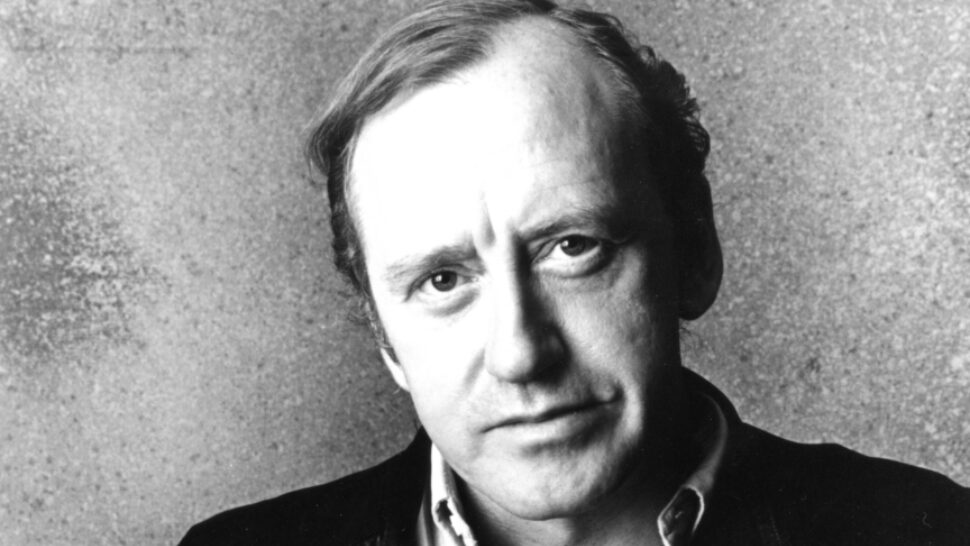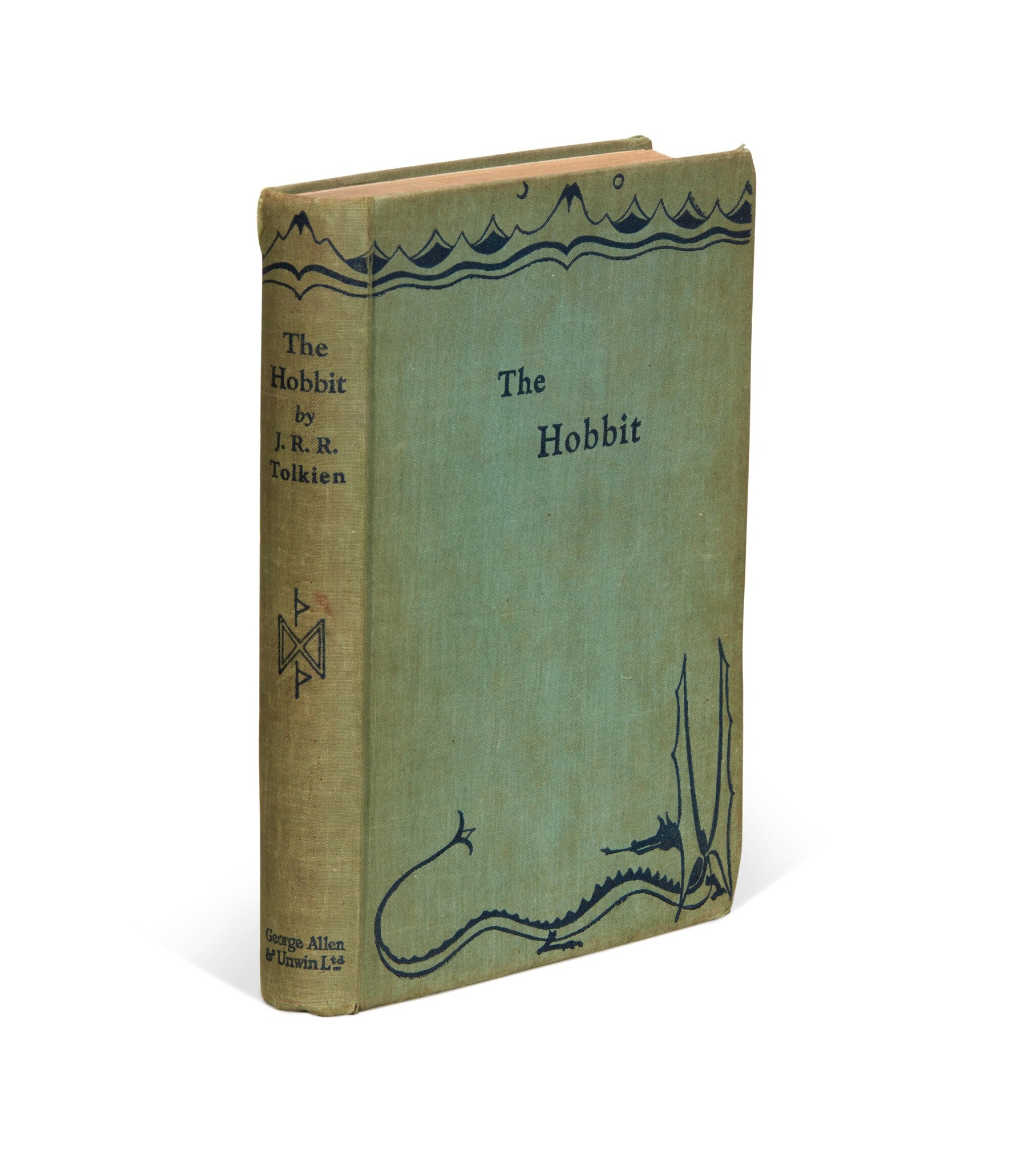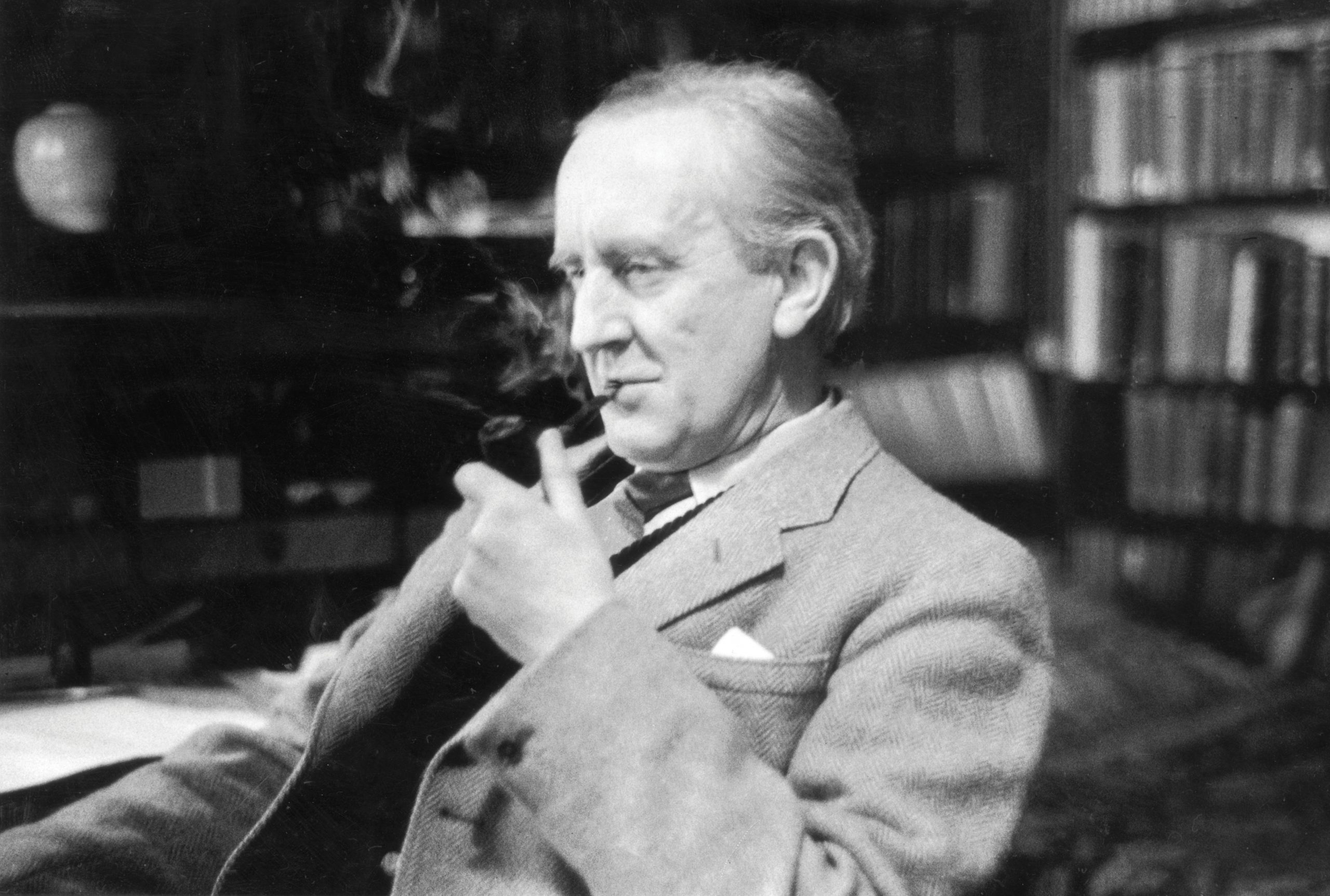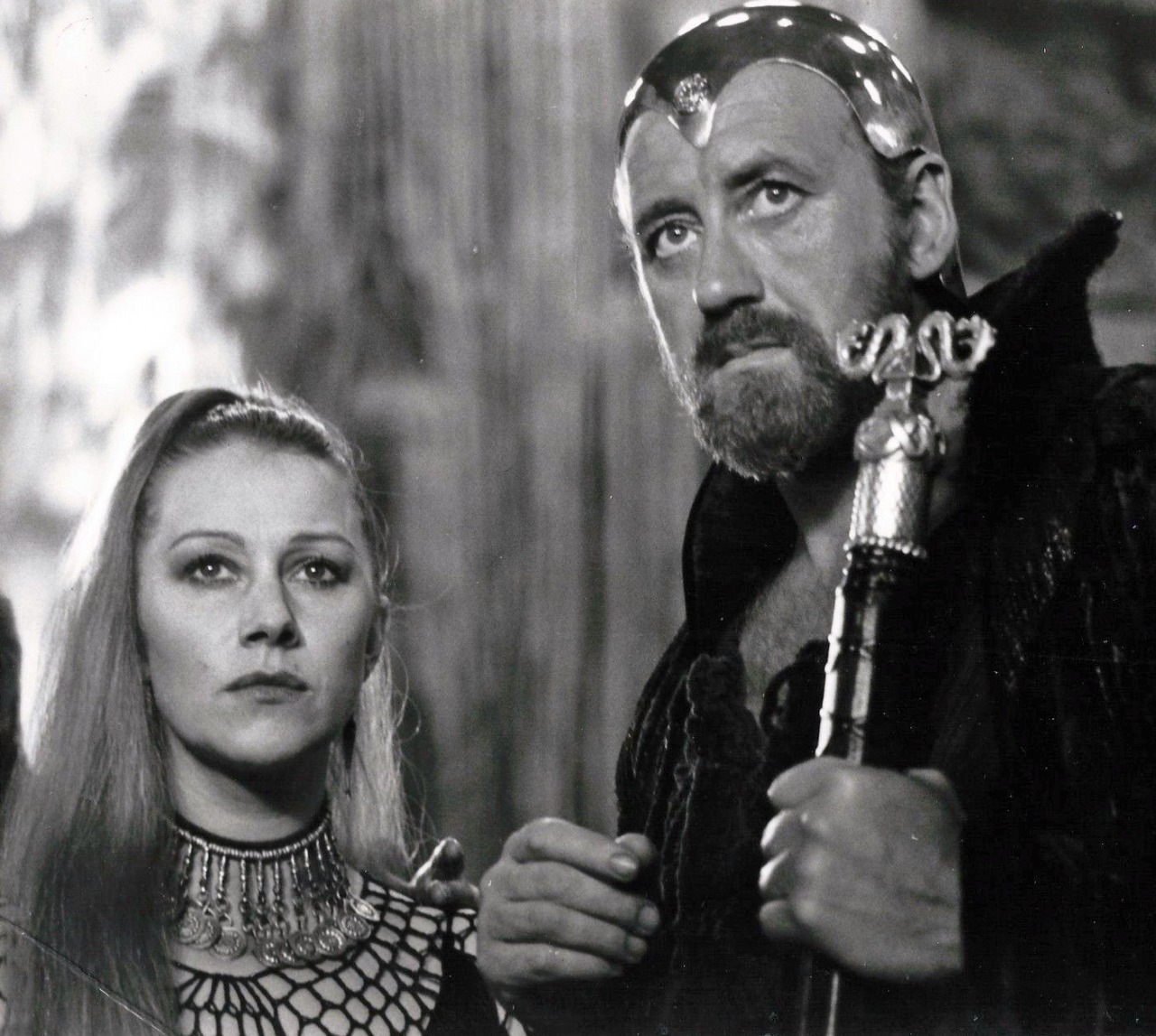"THE HOBBIT" - Read by Nicol Williamson
RECORDS "OFF THE BEATEN TRACK"
Forget the bloated “prequel” film trilogy by Peter Jackson. If you want to experience the real magic of J.R.R. Tolkien’s first novel, seek out a copy of this beautiful recording by the quirky Scottish actor, Nicol Williamson.
Whenever I pop into a record store, I always make a point of checking out the Spoken Word section. There are many unusual treasures to be found here, usually at rock bottom prices. And if you’re lucky, you might score a copy of this 4-LP set issued in 1974 by Argo Records (the U.K. based subsidiary of Decca). Just the other day I spied a copy at Amoeba Music in Hollywood.
I remember buying this when it came out. The Hobbit had been one of my favorite childhood books. So when, back in 1974, I saw this recording for sale in my local record store I snapped it up. I already had many Argo spoken word records in my collection, and they were all special. You felt like the actor was right there at your side, giving you your own private performance of this timeless literature. Also, I was an avid radio listener. Every day on the BBC you could hear plays and readings of the highest quality with top actors. To this day the UK retains its strong radio culture, embracing talk, drama, and music from the four corners of the Earth, now available via streaming to people the world over.
But that moment back in 1974 when I first dropped the needle on this 4-LP set - I knew this was something out-of-the ordinary. Music that seemed to genuinely hearken from Middle Earth ushered in those immortal words that open the novel (albeit abbreviated for this recording):
“In a hole in the ground there lived a hobbit. Not a dirty, wet hole, nor a dry, bare, sandy hole: it was a hobbit-hole, and that means comfort”.
The actor’s voice was warm and inviting, subtly imparting a sense of the everyday into his description of a fantasy land inhabited by these strange creatures called hobbits, to be joined as the story unfolded by dwarves, elves, goblins, a wizard - and a dragon! Every so often a particular word or phrase would stand out by virtue of the actor’s pause or subtle inflection. Throughout there was a relishing of the author’s language and idiom, conveyed with perfect pacing. There persisted also a sense of quiet wonder, of innocence embarking on a grand adventure, and also a sense of the fun of it all - a potential chuckle lurked round every corner. As the records and the adventure progressed a huge cast of characters was delineated by a virtuosic range of accents and vocal pitches. In short, the reading was masterful - and I have heard nothing on any subsequent audiobook, of any genre, to better it.
The Hobbit instantly became one of my most treasured records, and remains so to this day. It has never been issued on any format other than vinyl and cassette, and only recently became available as a stream on YouTube.
Anyone reading this who loves the book, and appreciates fine acting, should listen to it.
Here’s the story of how this record came to be.
The Beginnings of Spoken Word on Record
Long before the days of Audible and “books-on-tape", where you can download or stream unabridged copies of pretty much any book you care to mention, often read by the author or even a big name actor, there was a small but dedicated industry of spoken word LPs. Spoken word had been a feature of recorded sound since the beginning, but it was only with the advent of the long-playing record that the possibility of recording longer books and plays became a more viable practical and commercial proposition. The two main players in town were Caedmon and Argo.
The US company Caedmon had pioneered the recording and LP release of spoken word in the early 1950s. They made a big splash with a 1952 record of Welsh poet Dylan Thomas reading a selection of his own work. The B-side contained a collection of the poet’s childhood Christmas memories, which in various forms he had propagated since the 1930s, in particular on BBC Radio. This newest incarnation gained a title - A Child’s Christmas in Wales - and became a huge hit for Caedmon. In the years that followed, Caedmon recorded a wide range of poetry and plays, including the Shakespeare canon, working with many of the great actors of the period.
Across the pond, Argo started out in 1951 as a home for “British music played by British artists”, but rapidly developed into one of the more eclectic catalogues in the business, with everything from records of steam trains to field recordings of world music. Classical collectors will be familiar with the label’s wide range of pioneering early music records, and the many benchmark recordings by the choirs of King’s College, Cambridge, St’ John’s College, Cambridge, and, of course, the Academy of St. Martin-in-the-Fields with conductor Neville Marriner.
But Argo label co-founders Harley Usill and Cyril Clarke also began issuing all manner of spoken word recordings, many of which featured performances by the authors themselves. One of their earliest successes was, like Caedmon, with a Dylan Thomas work: Under Milk Wood. Argo issued the BBC recording of Thomas’s play - a portrait of life in a Welsh village, starring Richard Burton - in 1954, and it remained a solid seller in the catalogue for many years. In 1957 the label embarked on the ambitious project to record all of Shakespeare’s plays and poetry with Cambridge’s amateur Marlowe Dramatic Society supplemented by a rotating cast of professional actors. These recordings remain ground zero - and often the benchmark versions - for Shakespeare’s works on record, and within them you will hear the voices of many British actors who went on to become major stars, like Judi Dench, Ian Holm, Derek Jacobi, and Ian McKellen.
1957 was also the year in which Decca - the UK’s leading classical label along with EMI/Columbia/HMV - acquired Argo. With the increased resources of a major label behind it, Harley Usill - now Argo’s sole Managing Director who enjoyed complete autonomy - expanded his operations in all directions. Like Decca, Argo releases became well-known for their excellent sound and pressing quality, and the Argo classical catalogue contains many riches you can easily find at bargain-basement prices in the used bins. The Spoken Word catalogue continued to expand, and in 1974 Usill decided to follow up on the success of earlier dramatizations of children’s literature like Alice in Wonderland (1958), Through the Looking Glass (1959) and The Wind in the Willows (1960), with Tolkien’s more recently enshrined children’s classic, The Hobbit. Usill gained permission from the Tolkien estate to produce a necessarily abbreviated version, but in the case of this novel the recording would not be a full dramatization. Rather it would be a dramatic reading by a single actor. The only question was: who on earth should that actor be?
The Actor

Nicol Williamson was born in Scotland in 1936. Although greatly admired for his stage and screen work, he never gained the household name recognition of his contemporaries Peter O’Toole and Richard Harris, even though he was every bit as likely to raise hell offstage as well as on. His Hamlet with director Tony Richardson, co-starring Marianne Faithfull and Anthony Hopkins, was widely lauded, and he appeared in seminal productions of Beckett’s Waiting for Godot and John Osborne’s Inadmissable Evidence. It was generally believed that his reputation for being difficult behind-the-scenes, and occasionally during performances, earned him few favors over the span of his career.
Williamson came to wider recognition for his extraordinary turn as Merlin in John Boorman’s film, Excalibur (1981). To describe his performance as mercurial would be an understatement - it was the very definition of unpredictability. He received mixed notices, but I felt it was a highly imaginative approach to the character - a wizard whose true intentions can seem elusory at best, and whose personage exists beyond normal conventions, beyond normal notions even of time and space. I also recognized many of the traits that Williamson had brought to his recording of The Hobbit: sincerity, humor, idiosyncrasy, and a relishing of the many ways in which the human voice can coil itself in and around the English language.
When Williamson was suggested for the project to Harley Usill by an associate, Usill was thrilled to discover that the actor was already a big fan of Tolkien’s books, for in his own mind this had been an important prerequisite for whoever was to take on this recording. As Usill wrote in the set’s liner notes, his actor “would have to be sympathetic to the Tolkien world, for there are those who do not appreciate the remarkable world in which Bilbo Baggins, Thorin Oakenshield and Gandalf have their being, a world which was to be the prologue to the epic of The Lord of the Rings….” Together, actor and director worked closely to perform the necessary abbreviation of the text. They did it so well that you never for one moment feel that you are missing out.
As Usill reflected: “Working with Nicol on this recording has been one of the most satisfying experiences in twenty years of recording… I hope that Nicol’s performance will not only delight new converts to The Hobbit, but pass the sterner test that anyone attempting to record a classic invites - that of leaving all those who already know and love the tale feeling that, if they were to project it for themselves, this is how they would do it.”
Williamson’s adoption of a wide range of regional accents and tones of voice to delineate different characters, classes of characters, and the different lands and peoples of Middle Earth is masterful. Fans of HBO’s Game of Thrones will recognize how this technique was used similarly in the casting and performances of the largely British cast of that show.
For a prime example of Williamson’s virtuoso performance of a range of characters interacting, look no further than the scene where Bilbo and the dwarves are kidnapped by three trolls, only to be rescued by the magical “voice throwing" of Gandalf. (Begins at 25:53 “It began to get dark….”)
The Hobbit Part 1
And listen to the scene where Bilbo unwittingly acquires the Ring of power, and then has to outwit the strange creature Gollum. Suspenseful and unsettling. (Begins at 0:00)
The Hobbit Part 2
The Book
 1937 First Edition
1937 First Edition
There is little I can add of major significance to the voluminous critical and fan writing dedicated to Tolkien’s novel, but there are a few observations to be made which I think are of relevance when considering Nicol Williamson’s recording.
Tolkien was a Fellow of Pembroke College, Oxford, teaching Anglo-Saxon, at the time of writing The Hobbit in the 1930s. Up until this time he had had short pieces and poetry published in various magazines, and he had used his linguistics and English background to create Elven languages and associated mythologies - all first steps in the world-building of Middle Earth.
 J.R.R. Tolkien
J.R.R. Tolkien
Tolkien’s love of language in itself, and his evocative use of it in his descriptions and nomenclature, is everywhere apparent in The Hobbit. I mean, you only have to hear the names of our hero Bilbo Baggins, or the dwarf King Thorin Oakenshield, to know exactly what they look like and how they behave. And why avoid the obvious? Naming a region the Misty Mountains conveys everything a reader needs to know about this location (and is perfectly pitched for children). Needless to say, this is all fertile material for an actor like Nicol Williamson, used to performing Shakespeare. Hearing this language. these words, spoken aloud by this most imaginative of actors lends the book a vividness mere reading cannot match.
We know from a letter that Tolkien wrote to the poet W.H.Auden that the opening words of the book - “In a hole in the ground there lived a hobbit” - came to the author while he was grading the British equivalent of High School papers. This story is oddly resonant with the origins of the pre-eminent fantasy trilogy of our own time, Philip Pullman’s His Dark Materials.
Pullman, like Tolkien and the other great British fantasy writer C.S.Lewis before him, lived and taught in Oxford when he started writing his epic fantasy. Working in a little shed at the bottom of his garden, Pullman could not get the first book (Northern Lights) started. Until one day, in a flash of inspiration, the opening sentence came to him, fully formed: “Lyra and her daemon moved through the darkening Hall, taking care to keep to one side, out of sight of the kitchen.”
Not only is it a great hook into the story, it presents fully-formed the concept that helps drive a central idea in the trilogy: that in this parallel universe all humans have a spirit animal who expresses their innermost thoughts and emotions, and often acts upon them.
Pullman has talked about his theory as to why Oxford has produced so many great fantasy writers. He ascribes it to the uniqueness of the city: that you can be walking along a busy street, full of people, cars and buses, then take a few steps up into one of the Colleges and everything changes. Now you are walking down stone paths alongside beautifully manicured lawns, within the walls of centuries-old buildings where the students seem frozen in an eternity of youth, where professors always look the same, even as generations come and go. As your eye is drawn upwards by glimpses of the gleaming spires of college chapels and Oxford churches, what do you see? Gargoyles. Gargoyles everywhere, of every shape and hue.
It is this duality of environments, co-existing yet with hints of the darkness that can lurk below (or above), Pullman thinks, that inspires Oxford writers in particular to venture into fantasy fiction.
The Hobbit shares that lineage, a fact which is highlighted in Nicol Williamson’s performance. These hobbits, dwarves, elves and goblins may be acting out an incredible adventure in a strange land, but they also happen to sound just like regular British folk. Bilbo Baggins may be a hobbit in Middle Earth, but he could just as easily be that guy getting off a bus, or that student running towards a tutorial. Williamson’s performance is so welcoming, so attuned to all the currents of the text, that the listener need expend no effort to step into the characters’ shoes and share in their adventures.
The Recording
The production rightfully keeps things fully focused on the voice. There are no sound effects and only occasional bursts of music derived from medieval sources performed on period instruments.
The records are accompanied by an informative booklet which includes an essay about the philosophy and challenges of the production by Harley Usill. There is also an insightful essay titled “Tolkien and The Hobbit” by Lissa Demetriou, a frequent contributor to Argo recordings.
This masterpiece of spoken word recordings, thankfully preserved in unassuming but warm analogue sound, allows anyone who listens to it to enjoy the intimacy of a good friend sitting down to tell you a rich and strange story, and to use your imagination to be transported far beyond the confines of your everyday world.
Isn’t that what all the best records should do?
The Hobbit Part 3
The Hobbit Part 4
Album Credits:
The Recording adapted and directed by Harley Usill
Read by Nicol Williamson
Music by Thurston Dart and Bob Stewart
Recording Engineers: Kevin Daly and Ian Churches
Box Cover Picture by J.R.R.Tolkien
Catalogue #: Argo ZPL 1196/9
If music and sound knobs were available in "Features", The Hobbit would get a 10 for Music/Performance, and a 10 for Sound.
How Best to Listen to The Hobbit
This set was only ever issued on vinyl and cassette. Avoid the “Made in USA” pressings if possible - go for the original Decca. Short of acquiring the records, The Hobbit has finally popped up on YouTube. The links are above.
What to Listen To Next
Tolkien completists will definitely want to acquire the handful of recordings made by the author himself. I own one of these - “Poems and Songs of Middle Earth”. Issued by Caedmon in 1967 it is not something I need to listen to twice…. Aficionados of British comedy will enjoy hearing Donald Swann accompany his (non-comedic) settings of Tolkien poems - for about a minute. Swann is heard to much better effect on numerous records as one half of the brilliant musical duo Flanders and Swann, responsible for such wonders of satiric song as The Hippopotamus (“Mud, mud, glorious mud”) and Song of Patriotic Prejudice (“The English, the English are best/I wouldn’t give tuppence/For all of the rest…”)
The pioneering BBC radio adaptation of Lord of The Rings from 1981 was issued various times on cassette and CD. It’s very good, with full-bore sound effects etc., and fine performances by Ian Holm as Frodo, Michael Hordern as Gandalf, and John Le Mesurier as Bilbo. (In a nod to this recording, Peter Jackson cast Ian Holm as Bilbo in his original Lord of the Rings trilogy).
Beyond Tolkien I can fully recommend diving into any part of the Argo spoken word catalogue. It is a treasure-trove, and I will be selecting some choice items in a future article. To get you started, sample Alec Guinness’s double LP of poems by T.S. Eliot (including The Waste Land), and Richard Burton’s recording of The Rime of the Ancient Mariner, one side of a Coleridge compendium. Any of the Marlowe Dramatic Society Shakespeare recordings are worthwhile, but I have a special fondness for Julius Caesar, where Ian Holm (one of my favorite actors) turns up as a superb Cassius.
And if you haven’t seen it, do check out Nicol Williamson’s powerhouse performance as Merlin in Excalibur - the best version of the Arthurian legend put on celluloid to date (apart from Monty Python and the Holy Grail). This is full throttle, pedal-to-the-metal fantasy filmmaking of the highest order: bloody, sexy, and supremely strange. You will see Patrick Stewart (with hair) as a virile Knight of the Round Table trying to pull the sword Excalibur from the stone, and Helen Mirren getting wiggy as Merlin’s fellow sorcerer and arch-enemy Morgana Le Fay. Priceless.
 Helen Mirren and Nicol Williamson in Excalibur (1981)
Helen Mirren and Nicol Williamson in Excalibur (1981)







































.png)








